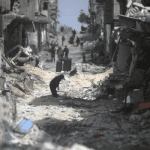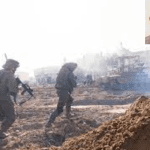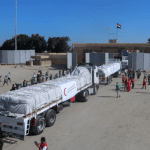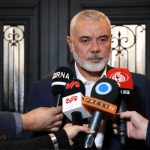The leaders of the United States, Egypt, and Qatar have urged Israel and Hamas to resume immediate negotiations to finalise a cease-fire and hostage release agreement, saying there are no excuses “from any party for further delay.”
The three countries, which have been attempting to mediate a deal, said in a joint statement that talks could take place on August 15 in either Doha or Cairo, adding that it was “time to bring immediate relief both to the longsuffering people of Gaza as well as the longsuffering hostages and their families”.
The leaders declared that a “framework agreement is now on the table with only the details of implementation left to conclude” and offered to provide “a final bridging proposal” to overcome the unresolved issues. Later on.
Moments after the announcement was released, Israel’s prime leader, Benjamin Netanyahu, announced that Israeli negotiators would be there. He stated that the goal was “to finalise the details and implement the framework agreement”. Netanyahu’s administration has been accused of persistently obstructing cease-fire negotiations.
The announcement of the talks came after Hamas named Yahya Sinwar – the alleged mastermind of the 7 October attack – as its new leader, sparking fears that negotiations have become even more difficult. Sinwar was appointed after the assassination of Ismail Haniyeh in Iran last month.
At least 15 people were killed in strikes on two schools functioning as shelters for people displaced from their homes in Gaza City, health officials in the Hamas-run territory said. The Israeli army said Hamas militants were using the schools as bases.
The Israeli military also renewed evacuation orders to Palestinian residents in several districts in the east of Khan Younis, Gaza’s second-largest city, saying it would act forcefully against militants who had unleashed rockets from those areas.
The army issued the evacuation order on X, and residents of the southern Gaza city reported receiving SMS and radio alerts.
Residents reported that scores of people had begun to leave their homes and travel west to al-Mawasi, a humanitarian-designated region but overloaded with displaced families from around the enclave.
Israel has classified al-Mawasi as a humanitarian zone, although it continues to bomb targets there. Khan Younis was extensively damaged during air and ground operations earlier this year.
The leaders of the United States, Egypt, and Qatar have urged Israel and Hamas to resume immediate negotiations to finalise a cease-fire and hostage release agreement, saying there are no excuses “from any party for further delay.”
The three countries, which have been attempting to mediate a deal, said in a joint statement that talks could take place on August 15 in either Doha or Cairo, adding that it was “time to bring immediate relief both to the longsuffering people of Gaza as well as the longsuffering hostages and their families”.
The leaders declared that a “framework agreement is now on the table with only the details of implementation left to conclude” and offered to provide “a final bridging proposal” to overcome the unresolved issues. Later on.
Moments after the announcement was released, Israel’s prime leader, Benjamin Netanyahu, announced that Israeli negotiators would be there. He stated that the goal was “to finalise the details and implement the framework agreement”. Netanyahu’s administration has been accused of persistently obstructing cease-fire negotiations.
The announcement of the talks came after Hamas named Yahya Sinwar – the alleged mastermind of the 7 October attack – as its new leader, sparking fears that negotiations have become even more difficult. Sinwar was appointed after the assassination of Ismail Haniyeh in Iran last month.
At least 15 people were killed in strikes on two schools functioning as shelters for people displaced from their homes in Gaza City, health officials in the Hamas-run territory said. The Israeli army said Hamas militants were using the schools as bases.
The Israeli military also renewed evacuation orders to Palestinian residents in several districts in the east of Khan Younis, Gaza’s second-largest city, saying it would act forcefully against militants who had unleashed rockets from those areas.
The army issued the evacuation order on X, and residents of the southern Gaza city reported receiving SMS and radio alerts.
Residents reported that scores of people had begun to leave their homes and travel west to al-Mawasi, a humanitarian-designated region but overloaded with displaced families from around the enclave.
Israel has classified al-Mawasi as a humanitarian zone, although it continues to bomb targets there. Khan Younis was extensively damaged during air and ground operations earlier this year.
The leaders of the United States, Egypt, and Qatar have urged Israel and Hamas to resume immediate negotiations to finalise a cease-fire and hostage release agreement, saying there are no excuses “from any party for further delay.”
The three countries, which have been attempting to mediate a deal, said in a joint statement that talks could take place on August 15 in either Doha or Cairo, adding that it was “time to bring immediate relief both to the longsuffering people of Gaza as well as the longsuffering hostages and their families”.
The leaders declared that a “framework agreement is now on the table with only the details of implementation left to conclude” and offered to provide “a final bridging proposal” to overcome the unresolved issues. Later on.
Moments after the announcement was released, Israel’s prime leader, Benjamin Netanyahu, announced that Israeli negotiators would be there. He stated that the goal was “to finalise the details and implement the framework agreement”. Netanyahu’s administration has been accused of persistently obstructing cease-fire negotiations.
The announcement of the talks came after Hamas named Yahya Sinwar – the alleged mastermind of the 7 October attack – as its new leader, sparking fears that negotiations have become even more difficult. Sinwar was appointed after the assassination of Ismail Haniyeh in Iran last month.
At least 15 people were killed in strikes on two schools functioning as shelters for people displaced from their homes in Gaza City, health officials in the Hamas-run territory said. The Israeli army said Hamas militants were using the schools as bases.
The Israeli military also renewed evacuation orders to Palestinian residents in several districts in the east of Khan Younis, Gaza’s second-largest city, saying it would act forcefully against militants who had unleashed rockets from those areas.
The army issued the evacuation order on X, and residents of the southern Gaza city reported receiving SMS and radio alerts.
Residents reported that scores of people had begun to leave their homes and travel west to al-Mawasi, a humanitarian-designated region but overloaded with displaced families from around the enclave.
Israel has classified al-Mawasi as a humanitarian zone, although it continues to bomb targets there. Khan Younis was extensively damaged during air and ground operations earlier this year.
The leaders of the United States, Egypt, and Qatar have urged Israel and Hamas to resume immediate negotiations to finalise a cease-fire and hostage release agreement, saying there are no excuses “from any party for further delay.”
The three countries, which have been attempting to mediate a deal, said in a joint statement that talks could take place on August 15 in either Doha or Cairo, adding that it was “time to bring immediate relief both to the longsuffering people of Gaza as well as the longsuffering hostages and their families”.
The leaders declared that a “framework agreement is now on the table with only the details of implementation left to conclude” and offered to provide “a final bridging proposal” to overcome the unresolved issues. Later on.
Moments after the announcement was released, Israel’s prime leader, Benjamin Netanyahu, announced that Israeli negotiators would be there. He stated that the goal was “to finalise the details and implement the framework agreement”. Netanyahu’s administration has been accused of persistently obstructing cease-fire negotiations.
The announcement of the talks came after Hamas named Yahya Sinwar – the alleged mastermind of the 7 October attack – as its new leader, sparking fears that negotiations have become even more difficult. Sinwar was appointed after the assassination of Ismail Haniyeh in Iran last month.
At least 15 people were killed in strikes on two schools functioning as shelters for people displaced from their homes in Gaza City, health officials in the Hamas-run territory said. The Israeli army said Hamas militants were using the schools as bases.
The Israeli military also renewed evacuation orders to Palestinian residents in several districts in the east of Khan Younis, Gaza’s second-largest city, saying it would act forcefully against militants who had unleashed rockets from those areas.
The army issued the evacuation order on X, and residents of the southern Gaza city reported receiving SMS and radio alerts.
Residents reported that scores of people had begun to leave their homes and travel west to al-Mawasi, a humanitarian-designated region but overloaded with displaced families from around the enclave.
Israel has classified al-Mawasi as a humanitarian zone, although it continues to bomb targets there. Khan Younis was extensively damaged during air and ground operations earlier this year.
The leaders of the United States, Egypt, and Qatar have urged Israel and Hamas to resume immediate negotiations to finalise a cease-fire and hostage release agreement, saying there are no excuses “from any party for further delay.”
The three countries, which have been attempting to mediate a deal, said in a joint statement that talks could take place on August 15 in either Doha or Cairo, adding that it was “time to bring immediate relief both to the longsuffering people of Gaza as well as the longsuffering hostages and their families”.
The leaders declared that a “framework agreement is now on the table with only the details of implementation left to conclude” and offered to provide “a final bridging proposal” to overcome the unresolved issues. Later on.
Moments after the announcement was released, Israel’s prime leader, Benjamin Netanyahu, announced that Israeli negotiators would be there. He stated that the goal was “to finalise the details and implement the framework agreement”. Netanyahu’s administration has been accused of persistently obstructing cease-fire negotiations.
The announcement of the talks came after Hamas named Yahya Sinwar – the alleged mastermind of the 7 October attack – as its new leader, sparking fears that negotiations have become even more difficult. Sinwar was appointed after the assassination of Ismail Haniyeh in Iran last month.
At least 15 people were killed in strikes on two schools functioning as shelters for people displaced from their homes in Gaza City, health officials in the Hamas-run territory said. The Israeli army said Hamas militants were using the schools as bases.
The Israeli military also renewed evacuation orders to Palestinian residents in several districts in the east of Khan Younis, Gaza’s second-largest city, saying it would act forcefully against militants who had unleashed rockets from those areas.
The army issued the evacuation order on X, and residents of the southern Gaza city reported receiving SMS and radio alerts.
Residents reported that scores of people had begun to leave their homes and travel west to al-Mawasi, a humanitarian-designated region but overloaded with displaced families from around the enclave.
Israel has classified al-Mawasi as a humanitarian zone, although it continues to bomb targets there. Khan Younis was extensively damaged during air and ground operations earlier this year.
The leaders of the United States, Egypt, and Qatar have urged Israel and Hamas to resume immediate negotiations to finalise a cease-fire and hostage release agreement, saying there are no excuses “from any party for further delay.”
The three countries, which have been attempting to mediate a deal, said in a joint statement that talks could take place on August 15 in either Doha or Cairo, adding that it was “time to bring immediate relief both to the longsuffering people of Gaza as well as the longsuffering hostages and their families”.
The leaders declared that a “framework agreement is now on the table with only the details of implementation left to conclude” and offered to provide “a final bridging proposal” to overcome the unresolved issues. Later on.
Moments after the announcement was released, Israel’s prime leader, Benjamin Netanyahu, announced that Israeli negotiators would be there. He stated that the goal was “to finalise the details and implement the framework agreement”. Netanyahu’s administration has been accused of persistently obstructing cease-fire negotiations.
The announcement of the talks came after Hamas named Yahya Sinwar – the alleged mastermind of the 7 October attack – as its new leader, sparking fears that negotiations have become even more difficult. Sinwar was appointed after the assassination of Ismail Haniyeh in Iran last month.
At least 15 people were killed in strikes on two schools functioning as shelters for people displaced from their homes in Gaza City, health officials in the Hamas-run territory said. The Israeli army said Hamas militants were using the schools as bases.
The Israeli military also renewed evacuation orders to Palestinian residents in several districts in the east of Khan Younis, Gaza’s second-largest city, saying it would act forcefully against militants who had unleashed rockets from those areas.
The army issued the evacuation order on X, and residents of the southern Gaza city reported receiving SMS and radio alerts.
Residents reported that scores of people had begun to leave their homes and travel west to al-Mawasi, a humanitarian-designated region but overloaded with displaced families from around the enclave.
Israel has classified al-Mawasi as a humanitarian zone, although it continues to bomb targets there. Khan Younis was extensively damaged during air and ground operations earlier this year.
The leaders of the United States, Egypt, and Qatar have urged Israel and Hamas to resume immediate negotiations to finalise a cease-fire and hostage release agreement, saying there are no excuses “from any party for further delay.”
The three countries, which have been attempting to mediate a deal, said in a joint statement that talks could take place on August 15 in either Doha or Cairo, adding that it was “time to bring immediate relief both to the longsuffering people of Gaza as well as the longsuffering hostages and their families”.
The leaders declared that a “framework agreement is now on the table with only the details of implementation left to conclude” and offered to provide “a final bridging proposal” to overcome the unresolved issues. Later on.
Moments after the announcement was released, Israel’s prime leader, Benjamin Netanyahu, announced that Israeli negotiators would be there. He stated that the goal was “to finalise the details and implement the framework agreement”. Netanyahu’s administration has been accused of persistently obstructing cease-fire negotiations.
The announcement of the talks came after Hamas named Yahya Sinwar – the alleged mastermind of the 7 October attack – as its new leader, sparking fears that negotiations have become even more difficult. Sinwar was appointed after the assassination of Ismail Haniyeh in Iran last month.
At least 15 people were killed in strikes on two schools functioning as shelters for people displaced from their homes in Gaza City, health officials in the Hamas-run territory said. The Israeli army said Hamas militants were using the schools as bases.
The Israeli military also renewed evacuation orders to Palestinian residents in several districts in the east of Khan Younis, Gaza’s second-largest city, saying it would act forcefully against militants who had unleashed rockets from those areas.
The army issued the evacuation order on X, and residents of the southern Gaza city reported receiving SMS and radio alerts.
Residents reported that scores of people had begun to leave their homes and travel west to al-Mawasi, a humanitarian-designated region but overloaded with displaced families from around the enclave.
Israel has classified al-Mawasi as a humanitarian zone, although it continues to bomb targets there. Khan Younis was extensively damaged during air and ground operations earlier this year.
The leaders of the United States, Egypt, and Qatar have urged Israel and Hamas to resume immediate negotiations to finalise a cease-fire and hostage release agreement, saying there are no excuses “from any party for further delay.”
The three countries, which have been attempting to mediate a deal, said in a joint statement that talks could take place on August 15 in either Doha or Cairo, adding that it was “time to bring immediate relief both to the longsuffering people of Gaza as well as the longsuffering hostages and their families”.
The leaders declared that a “framework agreement is now on the table with only the details of implementation left to conclude” and offered to provide “a final bridging proposal” to overcome the unresolved issues. Later on.
Moments after the announcement was released, Israel’s prime leader, Benjamin Netanyahu, announced that Israeli negotiators would be there. He stated that the goal was “to finalise the details and implement the framework agreement”. Netanyahu’s administration has been accused of persistently obstructing cease-fire negotiations.
The announcement of the talks came after Hamas named Yahya Sinwar – the alleged mastermind of the 7 October attack – as its new leader, sparking fears that negotiations have become even more difficult. Sinwar was appointed after the assassination of Ismail Haniyeh in Iran last month.
At least 15 people were killed in strikes on two schools functioning as shelters for people displaced from their homes in Gaza City, health officials in the Hamas-run territory said. The Israeli army said Hamas militants were using the schools as bases.
The Israeli military also renewed evacuation orders to Palestinian residents in several districts in the east of Khan Younis, Gaza’s second-largest city, saying it would act forcefully against militants who had unleashed rockets from those areas.
The army issued the evacuation order on X, and residents of the southern Gaza city reported receiving SMS and radio alerts.
Residents reported that scores of people had begun to leave their homes and travel west to al-Mawasi, a humanitarian-designated region but overloaded with displaced families from around the enclave.
Israel has classified al-Mawasi as a humanitarian zone, although it continues to bomb targets there. Khan Younis was extensively damaged during air and ground operations earlier this year.














